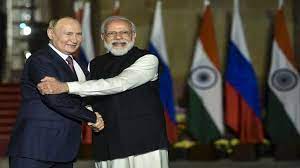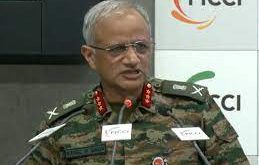New Delhi: India and Russia agreed to enhance cooperation and coordination on a range of issues including trade, investment and the situation in Afghanistan. The two sides signed 28 agreements during the annual summit between Prime Minister Narendra Modi and President Vladimir Putin. At the same time, they resolved to enhance cooperation and coordination in dealing with major challenges such as the threat from terrorism and the evolving situation in Afghanistan.
Foreign Secretary Harsh Vardhan Shringla said that Russia has started the delivery of its long-range S-400 surface-to-air missile defense system to India. Russian President Vladimir Putin talked about holding summits every year. “Supply of the S-400 has started this month and will continue to do so,” Shringla said.
Russia and India held talks on many issues and 28 agreements were signed between the two countries. The two sides reached an agreement on the Program of Defense Cooperation during 2021-31 and an agreement for the purchase of over 600,000 AK-203 assault rifles by India to form a new joint venture.
Both sides have set a target of increasing bilateral trade to $30 billion and bilateral investment to $50 billion by 2025. PM Modi and Putin discussed ways to enhance economic cooperation, including long-term purchases of essential commodities from Russia, elimination of trade barriers. Also talked about connectivity options such as the International North South Trade Corridor and the Chennai-Vladivostok Maritime Corridor.
Foreign Secretary Harsh Vardhan Shringla said that the two countries also shared views on long-term cooperation and arrangements for supply of energy, inland waterways, civil shipbuilding, fertilisers, steel, coking coal and skilled manpower. In his inaugural address at the summit, PM Modi said that India-Russia friendship “remains stable” despite several fundamental changes on the world stage and the two countries cooperated closely, paying attention to each other’s sensitivity. Putin, in his inaugural address, described India as a “great power” and a time-tested friend. Said that Russia works with India in the military-technical area “in a way that we do not with any of our partners”.
Modi and Putin decided to continue close consultation and coordination on the situation in Afghanistan. Foreign Secretary Harsh Vardhan Shringla said in a media briefing that both sides would work for a peaceful, secure and stable Afghanistan with an inclusive government representing all sections of the society. “Both sides were also clear that the territory of Afghanistan should not be used for harboring, training, planning or financing any terrorist activity,” Shringla said.
A joint statement issued after the summit said, “Both sides strongly condemned terrorism in all its forms and manifestations and urged the international community to intensify cooperation against terrorism, including safe havens, terrorist financing, weapons and drugs.” Drug trafficking, bigotry and malicious use of ICTs.
The joint statement specifically made reference to preventing Islamic State, al-Qaeda and Lashkar-e-Taiba from being used for terrorist activities, and called for ensuring that “Afghanistan never becomes the center of global terrorism.” will not be a safe haven for him”.
A contract was signed for India to procure 601,427 AK-203 rifles through the joint venture Indo-Russian Rifles Pvt Ltd after talks between Defense Minister Rajnath Singh and his Russian counterpart Sergei Shoigu. Other agreements covered areas as diverse as trade, energy, intellectual property, accountancy, cyber attacks in the banking sector, manpower, geological exploration and survey, culture and education.
These include a Roadmap for Science, Technology and Innovation Cooperation, a Memorandum of Cooperation (MoU) in Intellectual Property, research for peaceful purposes and the use of outer space and an agreement on technology protection due to cooperation in the manufacture and operation of launch vehicles. Were. Ground-based space infrastructure, a Memorandum of Understanding between India’s opto-electronics factory and Rosoboronexport and an agreement between Indian Oil Corporation and Rosneft for the supply of crude oil.
Shringla said the two sides deferred the signing of the Reciprocal Exchange of Logistics (RELOS) agreement “for the time being” as “there are still some issues we need to discuss”. It is expected that the agreement will be signed soon.
Without naming China, Defense Minister Rajnath Singh said in his opening remarks at the meeting that India is facing challenges posed by the “extraordinary militarization” of its neighborhood and “unprovoked aggression” on the northern border, and the country is looking for such partners. Which fulfills the military needs of India.
 Indian Thought Latest News & Views
Indian Thought Latest News & Views


